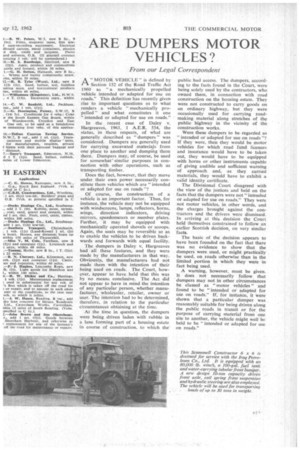ARE DUMPERS MOTOR VEHICLES?
Page 97

If you've noticed an error in this article please click here to report it so we can fix it.
From our Legal Correspondent
A "MOTOR VEHICLE" is defined by
Section 152 of the Road Traffic Act 1960 as "a mechanically propelled vehicle intended or adapted for use on roads." This definition has recently given rise to important questions as to what renders a vehicle "mechanically propelled" and what constitutes it one "intended or adapted for use on roads."
In the recent case of Daley v. Hargreaves, 1961, 1 A.E.R. 554, the status, in these respects, af what are generally described as " dumpers " was considered. Dumpers are generally used for carrying excavated materials from one place to another and dumping them there. Dumpers may, of course, be used for somewhat' similar purposes in connection with other operations, such as transporting timber.
Does the fact, however, that they move under their own power necessarily constitute them vehicles which are " intended or adapted for use on roads"?
Of course, the construction of a vehicle is an important factor. Thus, for instance, the vehicle may not be equipped with windscreens, lamps, reflectors, horns, wings, direction indicators, driving mirrors, speedometers or number plates. Further, it may be equipped with mechanically operated shovels or scoops. Again, the seats may be reversible so as to enable the vehicles to be driven backwards and forwards with equal facility.
The dumpers in Daley v. Hargreaves had all these features, and they were made by the manufacturers in that way. Obviously, the manufacturers had not made them with the intention of their being used on roads. The Court, however, appear to have held that this was by no means conclusive. The Act did not appear to have in mind the intention of any particular person, whether manufacturer, wholesaler, retailer, owner or user. The intention had to bc determined, therefore, in relation to the particular circumstances obtaining at the time.
At the time in question, the dumpers were being driven laden with rubble in a lane forming part of a housing estate in course of construction, to which the public had access. The dumpers, according to the facts found in the Court, were being solely used by the contractors, who owned them, in connection with road construction on the housing estate. They were not constructed to carry goods on an ordinary highway, but they were occasionally used for carrying roadmaking material along stretches of the public highway in the vicinity of the construction works.
Were these dumpers to be regarded as "intended or adapted for use on roads "? if they were, then they would be motor vehicles for which road fund licences and insurance would have to be taken out, they would have to be equipped with horns or other instruments capable of giving audible and sufficient warning of approach and, as they carried materials, they would have to exhibit a valid identity certificate.
The Divisional Court disagreed with the view of the justices and held on the facts that the dumpers were not "intended or adapted for use on roads." They were not motor vehicles, in other words, and the charges brought against the contractors and the drivers were dismissed. In arriving at this decision the Court held themselves constrained to follow an earlier Scottish decision, on very similar facts.
The basic of the decision appears to have been founded on the fact that there was no evidence to show that the dumpers were used, or might practically be used, on roads otherwise than in the limited portion in which they were in fact being used.
A warning, however, must be given. It does not necessarily follow, that dumpers may not in other circumstances be classed as "motor, vehicles" and found to be "intended or adapted for use on roads." If, for instance, it were shown that a particular dumper was reasonably suitable for being driven along the public roads in transit or for the purpose of carrying material from one site to another, the vehicle might well be held to he "intended or adapted for use on roads."








































































































































